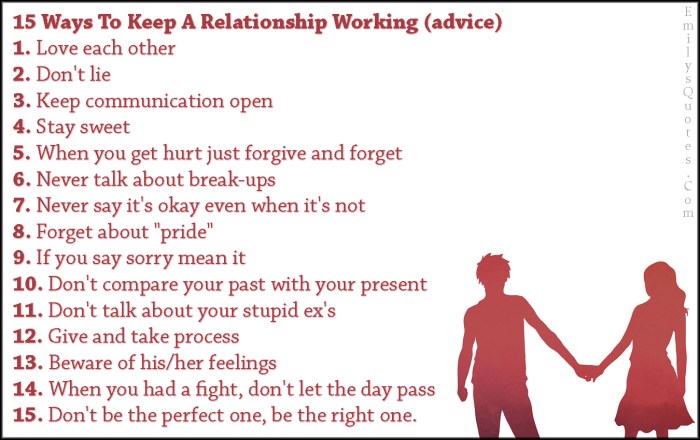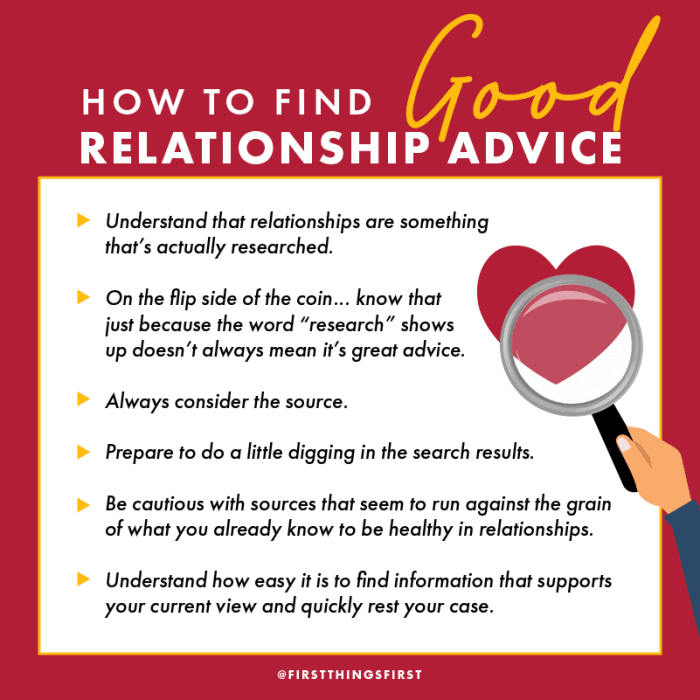Relationship Advice: buckle up for a ride through the ins and outs of navigating relationships like a pro. From effective communication to handling conflicts, we’ve got you covered.
Whether you’re seeking professional advice or tips from friends, understanding the importance of relationship advice is key to building a strong and lasting bond with your partner.
Importance of Relationship Advice
Seeking relationship advice is crucial in maintaining a healthy and thriving relationship. It provides an outside perspective, guidance, and tools to navigate through challenges that may arise in a relationship. Communication is key in any relationship, and relationship advice can greatly improve communication between partners by offering strategies to effectively express thoughts, feelings, and needs.
Improving Communication
- Relationship advice can help couples learn active listening skills, allowing them to truly hear and understand each other’s perspectives without judgment.
- It can also provide techniques for conflict resolution, helping partners communicate their needs and find mutually beneficial solutions.
- By seeking advice, couples can learn how to express appreciation and gratitude towards each other, fostering a positive and loving environment.
Strengthening and Maintaining the Relationship
- Relationship advice can offer insights on how to keep the spark alive in a long-term relationship, such as planning date nights, surprises, and adventures together.
- It can also guide partners on how to navigate through major life transitions, like moving in together, getting married, or starting a family.
- Additionally, relationship advice can help couples set boundaries, establish trust, and build a strong foundation of respect and understanding.
Types of Relationship Advice
Relationship advice comes in various forms, each with its own unique perspective and approach. It is important to understand the different types of relationship advice available in order to make informed decisions about seeking help.
Professional Relationship Advice vs. Advice from Friends or Family
When it comes to seeking relationship advice, individuals often turn to either professionals or their friends and family. Professional relationship advice is typically offered by counselors, therapists, or psychologists who have the training and expertise to provide guidance based on psychological principles and therapeutic techniques. On the other hand, advice from friends and family is based on personal experiences and opinions, which may not always be objective or impartial.
Benefits of Seeking Advice from a Relationship Counselor or Therapist:
- Professional counselors and therapists are trained to offer unbiased and non-judgmental support.
- They can provide tools and strategies to help improve communication and resolve conflicts in relationships.
- Therapists can help individuals gain insight into their own behaviors and patterns that may be contributing to relationship issues.
- They can offer a safe and confidential space for couples to explore their feelings and work through challenges.
Effective Communication in Relationships: Relationship Advice

Effective communication plays a crucial role in maintaining a healthy and successful relationship. It involves expressing your thoughts, feelings, and needs clearly while also actively listening to your partner. Good communication helps build trust, resolve conflicts, and deepen emotional intimacy.
Tips to Improve Communication with Your Partner
- Practice active listening: Focus on what your partner is saying without interrupting. Reflect back on what they’ve said to show understanding.
- Be honest and open: Share your thoughts and feelings honestly, even if they are difficult. Avoid bottling up emotions.
- Use “I” statements: Instead of blaming or accusing, use phrases like “I feel” to express your emotions without putting your partner on the defensive.
- Set aside time to talk: Create a safe space for open communication where both partners can express themselves without distractions.
- Seek to understand: Try to see things from your partner’s perspective and validate their feelings, even if you don’t agree.
Examples of Healthy Communication Habits in a Relationship
- Resolving conflicts calmly by discussing the issue rationally and respectfully.
- Expressing appreciation and gratitude for each other regularly.
- Checking in with each other emotionally and offering support when needed.
- Sharing goals and aspirations to create a sense of unity and collaboration.
- Celebrating successes together and being each other’s biggest cheerleader.
Handling Conflict in Relationships

Dealing with conflict in a relationship is crucial for its success. It’s important to have strategies in place to resolve disagreements in a healthy and constructive manner. This involves practicing compromise, understanding, and effective communication skills.
Strategies for Resolving Conflicts, Relationship Advice
- Listen actively to your partner’s perspective without interrupting.
- Avoid blaming and instead focus on finding solutions together.
- Take a break if emotions are running high to prevent saying hurtful things.
- Express your feelings using “I” statements to avoid sounding accusatory.
Importance of Compromise and Understanding
Compromise is essential in any relationship as it shows a willingness to meet halfway and find common ground. Understanding your partner’s point of view can help in resolving conflicts more effectively as it promotes empathy and respect.
Navigating Conflict in a Constructive Manner
Instead of trying to win an argument, focus on finding a solution that benefits both partners.
Seek to understand your partner’s feelings and validate them, even if you disagree.
Practice active listening and repeat back what your partner is saying to ensure you understand correctly.
Building Trust and Intimacy
Building trust and intimacy is crucial in a relationship as it forms the foundation for a strong and lasting bond between partners. Trust allows for open communication, honesty, and vulnerability, while intimacy brings closeness, connection, and emotional security.
Tips for Building Trust and Deepening Intimacy
- Communicate openly and honestly: Share your thoughts, feelings, and fears with your partner to foster trust and intimacy.
- Show empathy and understanding: Listen actively to your partner and try to see things from their perspective.
- Be reliable and consistent: Keep your promises and be there for your partner when they need you.
- Respect boundaries: Understand and respect each other’s personal space and boundaries.
- Express appreciation and affection: Show love and gratitude towards your partner to strengthen emotional connection.
Activities to Strengthen Trust and Intimacy
- Plan a weekend getaway: Spend quality time together in a new environment to create shared memories.
- Have deep conversations: Talk about your dreams, fears, and aspirations to deepen emotional intimacy.
- Engage in trust-building exercises: Try activities that require teamwork and mutual reliance to build trust.
- Practice physical touch: Hug, kiss, and cuddle to enhance feelings of closeness and connection.
- Engage in mutual hobbies: Find activities you both enjoy and engage in them together to bond over shared interests.